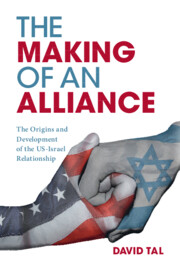Book contents
- The Making of an Alliance
- The Making of an Alliance
- Copyright page
- Dedication
- Contents
- Acknowledgements
- Introduction
- 1 The Sources of the American Support for Zionism
- 2 Friendship
- 3 Friendly Impartiality, 1949–1958
- 4 Strategic Change, 1958–1968
- 5 From Friendship to Strategic Alliance, 1969–1989
- 6 Friendship and Strategic Alliance
- Conclusion
- Bibliography
- Index
6 - Friendship and Strategic Alliance
Published online by Cambridge University Press: 23 December 2021
- The Making of an Alliance
- The Making of an Alliance
- Copyright page
- Dedication
- Contents
- Acknowledgements
- Introduction
- 1 The Sources of the American Support for Zionism
- 2 Friendship
- 3 Friendly Impartiality, 1949–1958
- 4 Strategic Change, 1958–1968
- 5 From Friendship to Strategic Alliance, 1969–1989
- 6 Friendship and Strategic Alliance
- Conclusion
- Bibliography
- Index
Summary
The period since the 1990s has proved, in an ironic way, the strength of Israel–US relations. In 1991, American president, George H. W. Bush, clashed with Israel, and since 1996, Prime Minister Benjamin Netanyahu had strained Israel–US relations in an unprecedented manner. In both cases, the constants that determined the course of the Israel–US relationship, religion, shared values, and history, proved to be stronger than any individual, regardless of their position. The period covered in this chapter was characterized by a close friendship and strategic partnership between the two nations. During those years, the two countries signed several memoranda of understanding which solidified the American commitment to Israel’s security and ensured its qualitative military edge, as well as expanding the cooperation on economic and cultural matters. The military-industrial cooperation as well as security cooperation between the two countries deepened. The growing Israeli attachment to American culture and values was another manifestation of the deepening relations between the two countries. The Israeli economy changed from socialist to neoliberal under the influence of American economic thinking. Neoconservatism spread across Israel’s political and intellectual elites through institutions and people, most notably Prime Minister Benjamin Netanyahu. The Israelis adopted many of the characteristics of American culture and economy, bringing their country closer to the United States in form and content. The ties between Israel and the Christian Zionist Evangelicals deepened as well. With the Evangelicals returning to the forefront of American politics since the mid-1970s, they became a major force in the support of Israel, a tendency that was especially encouraged by the right wing in Israel. Evangelical support for Israel has only increased during the 1990s and 2000s.
Keywords
- Type
- Chapter
- Information
- The Making of an AllianceThe Origins and Development of the US-Israel Relationship, pp. 301 - 353Publisher: Cambridge University PressPrint publication year: 2022

